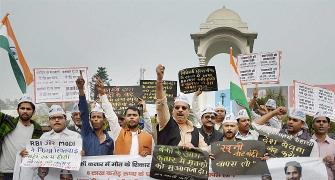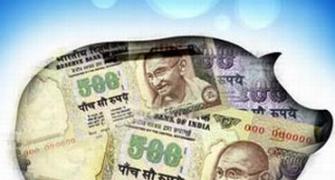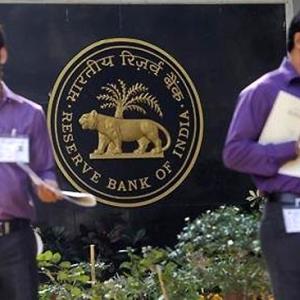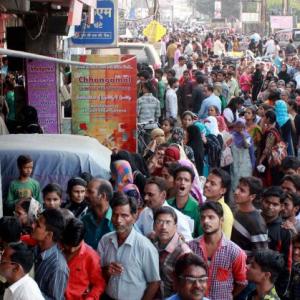Two out of 12 experts polled say central bank will cut rate to cushion note ban blow; others say Fed rate hike might make it push the pause button, reports Business Standard's Anup Roy.
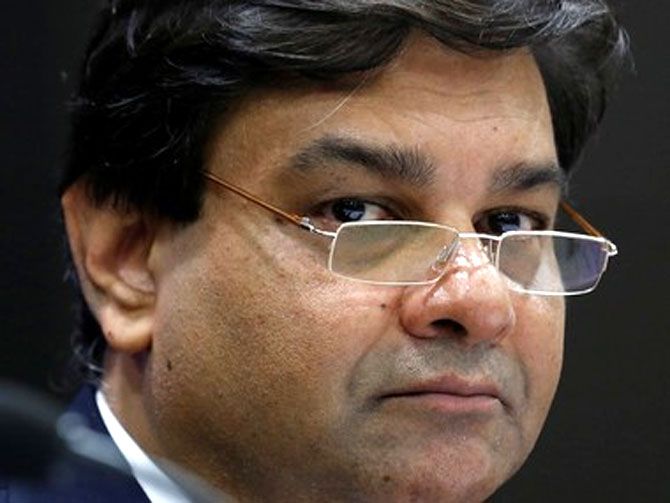 The six-member monetary policy committee headed by Reserve Bank of India Governor Urjit Patel is likely to cut the policy rate by at least 25 basis points in the December 6-7 policy review.
The six-member monetary policy committee headed by Reserve Bank of India Governor Urjit Patel is likely to cut the policy rate by at least 25 basis points in the December 6-7 policy review.
But, the case for a pause is equally strong, say economists.
However, the central bank is unlikely to pause, given a demonetisation-induced slowdown.
"Demonetisation and its impact would justify a rate cut," says Upasna Bharadwaj, economist at the Kotak Mahindra Bank.
"The market has largely factored in a 25-basis-point rate cut. If the central bank sounds dovish and realistic about future rate cuts, the market would take comfort from that," she added.
Two out of the 12 economists, bond market dealers and rating agency officials polled by Business Standard say the RBI will go for at least a 25 basis-point cut.
The economic slowdown due to demonetisation is expected to shave off a percentage point from the gross domestic product growth and so a rate cut at this point to encourage private-sector loan offtake and spending will be needed.
However, the US Federal Reserve is highly likely to increase its policy rate in mid-December.
If that happens, the interest rate differential between India and the US will narrow, making it unattractive for investors to put in money here.
Some of that sentiment has already started reflecting in the market.
In November alone, the outflow from the Indian markets (both bond and equity) has been $7 billion.
A rate cut will only increase the pace of withdrawal as yield-chasing investors would want to invest money in US-based assets or at least in those emerging markets with stable macroeconomic environment that would offer a higher interest rate than India.
Besides, how much will the demonetisation move impact the economy is still not clear.
Both CRISIL and India Ratings have lowered their economic growth estimates by one percentage point.
At this rate, India's economic growth might be at a three-year low.
Soumyajit Niyogi, associate director of research at India Ratings, says the RBI may exercise a pause.
"There is a good chance of a pause as the Monetary Policy Committee would want to wait to see the impact of the demonetisation drive in the economy in the short- to medium-term and also assess the global situation after a US Fed rate hike," says Niyogi.
Similarly, Rupa Rege Nitsure, group chief economist at L&T Finance, says the RBI may keep the status quo now, but cut aggressively in February, after seeing the impact of the December Fed rate hike and the economic atmosphere following Donald Trump's elevation as the US president in January.
"December is full of several high-impact global events that may create a risk-off environment for emerging markets, including India," says Nitsure.
"The RBI," she says, "will have to closely monitor the pressure on the rupee as well. Moreover, some transmission has already happened through the bank lending rates post demonetisation. It makes sense to wait now and reduce rates more aggressively by 50 basis points in February."
But most other economists and analysts point out that the RBI may not have much of choice but to cut rates.
"There is a great likelihood that the rate cut would not be drastic but only 25 basis points," says Ranen Banerjee, leader for public finance and economics at PwC India.
Economists say they are more interested about the RBI's assessment of the demonetisation hit and its take on the liquidity situation than the policy rate per se.
"We expect a clear statement on the currency trend, and also a clear objective of the demonetisation exercise. How the cash reserve ratio (CRR) would be phased out should also be part of the policy," says Soumya Kanti Ghosh, group chief economist at the State Bank of India.
The RBI had on November 26 suddenly hiked banks’ cash reserve ratio (CRR) to 100% on deposits mobilised between September 16 and November 11, sucking out Rs 3.24 lakh crore of liquidity.
The temporary measure is to be reviewed before Friday.
Last Friday, the central bank provided some succour to banks by saying it would sterilise liquidity through special bonds, assuring the CRR will be brought down.
Analysts now say they will be watching to see how the central bank phases out the extra CRR. They expect detailed measures to be announced in the policy.
"We would like to see how the RBI addresses the frictional and structural liquidity problems," Aditi Nayar, economist at Icra, says. "If the government and the RBI decide that they don't want to keep the currency in circulation as high as it is, we would like to know what path has to be followed."
According to Nayar, the RBI may conduct secondary market bond sales to remove liquidity permanently, instead of letting banks keep money in the reverse repo window.
As far as inflation is concerned, it is well within the RBI's control and the demonetisation impact will only help in deflating some of the prices further.
Therefore, there is no worries if a rate cut would jack up prices.
Besides, the scope for rate cuts would be seriously limited as the US Federal Reserve would assume the focal point.
A new US president in the world's largest economy will decide on the country's infrastructure spending plan, which will have an effect on much of the global economy.
The focus, after the US Federal Reserve review on mid-December, would shift from India to the US and the global economy.
Therefore, the scope for rate cuts would shrink considerably, say economists.
The six-member monetary policy committee had on October 4 cut repo rate by 25 basis points to 6.25%.
IMAGE: Reserve Bank of India Governor Dr Urjit Patel.


